Gardening in Riverhills: A Comprehensive Guide to Thriving Green Spaces
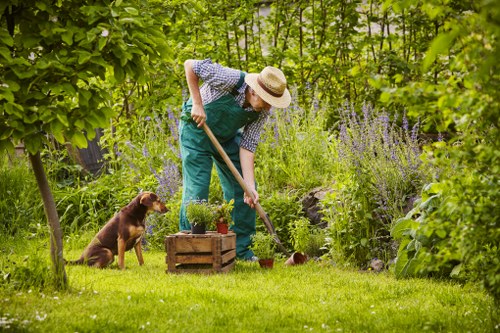
Introduction to Gardening in Riverhills
Gardening in Riverhills offers a unique opportunity to cultivate beautiful and sustainable landscapes. With its favorable climate and fertile soil, Riverhills is an ideal location for both novice and experienced gardeners looking to create vibrant green spaces.
The community of Riverhills takes pride in its lush gardens, which not only enhance the aesthetic appeal but also contribute to the environmental well-being of the area. Whether you're interested in growing ornamental plants, vegetables, or creating a serene backyard retreat, Riverhills provides the perfect setting.
In this guide, we'll explore the best practices, tips, and local resources available to help you achieve gardening success in Riverhills. From selecting the right plants to understanding the local climate, this article covers everything you need to know to make your garden thrive.
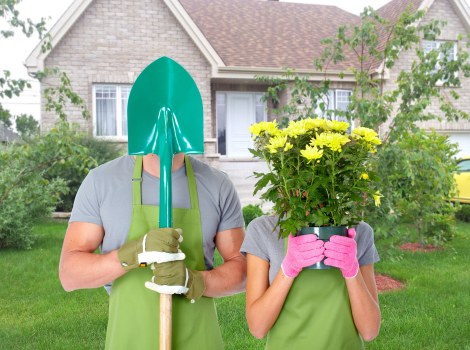
Understanding the Riverhills Climate
The climate in Riverhills is characterized by warm summers and mild winters, making it suitable for a wide variety of plants. Understanding the local climate is essential for selecting plants that will thrive in your garden.
Temperature: Riverhills experiences average summer temperatures ranging from 75°F to 85°F, while winter temperatures typically hover between 30°F and 50°F. This range allows for a diverse selection of plants, from heat-tolerant species to those that can withstand cooler temperatures.
Rainfall: The area receives moderate rainfall throughout the year, with occasional dry spells. Implementing proper irrigation systems and selecting drought-resistant plants can help maintain a healthy garden despite fluctuations in rainfall.
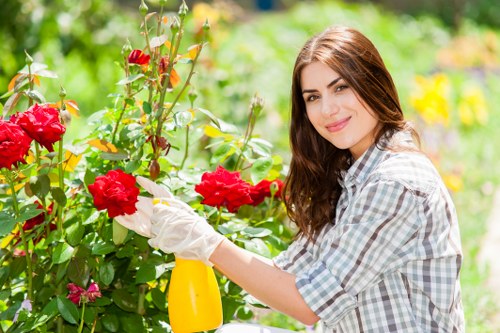
Soil Preparation and Management
Healthy soil is the foundation of a successful garden. In Riverhills, the soil is typically rich in nutrients, but it’s important to ensure proper drainage and pH levels for optimal plant growth.
Soil Testing: Conducting a soil test can determine the pH level and nutrient content of your garden soil. Most plants thrive in soil with a pH between 6.0 and 7.0.
Amending the Soil: Adding organic matter such as compost or well-aged manure can improve soil structure, increase nutrient availability, and enhance moisture retention. Regularly amending your soil ensures long-term garden health.
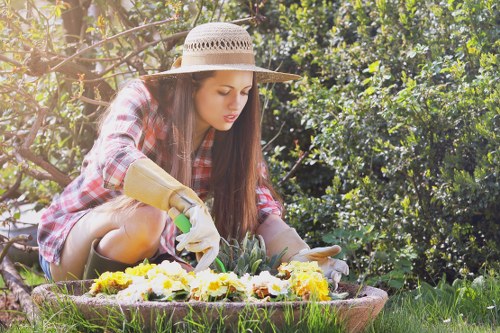
Choosing the Right Plants for Riverhills Gardens
Perennials and Annuals
Selecting a mix of perennials and annuals can provide continuous color and structure to your garden throughout the seasons.
- Perennials: Plants like lavender, hostas, and peonies return year after year, offering reliability and longevity.
- Annuals: Flowers such as marigolds, petunias, and zinnias provide vibrant, seasonal bursts of color.
Vegetable Gardening
Riverhills’ climate is ideal for growing a variety of vegetables. Popular choices include tomatoes, peppers, cucumbers, and leafy greens.
- Tomatoes: Require full sun and regular watering for the best yields.
- Peppers: Thrive in warm conditions and can be harvested throughout the summer.
- Cucumbers: Need support structures like trellises to grow vertically.
- Leafy Greens: Spinach, lettuce, and kale are excellent for cooler seasons.
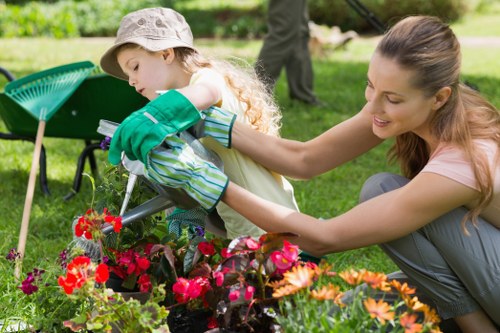
Garden Design and Layout
Planning Your Garden Space
Effective garden design begins with thoughtful planning. Consider the size of your garden, sunlight exposure, and the types of plants you wish to grow.
Sunlight: Most vegetables and flowering plants require at least six hours of direct sunlight daily. Observe your garden space to determine the sunniest areas.
Water Flow: Ensure that your garden layout accommodates proper water drainage to prevent root rot and other moisture-related issues.
Gardening Structures
Incorporating structures such as raised beds, pergolas, and trellises can enhance both the functionality and aesthetic appeal of your garden.
- Raised Beds: Improve soil drainage and make gardening more accessible.
- Pergolas: Provide shade and can support climbing plants like vines and roses.
- Trellises: Ideal for vegetables like cucumbers and beans, as well as decorative plants.
Maintenance Tips
Regular maintenance is crucial for the health and beauty of your Riverhills garden. This includes tasks such as watering, weeding, pruning, and pest control.
Watering: Establish a consistent watering schedule, preferably in the early morning, to ensure plants receive adequate moisture without excessive evaporation.
Weeding: Keep your garden free of weeds, which compete with your plants for nutrients and water. Hand-pulling and mulching are effective weed control methods.
Seasonal Gardening in Riverhills
Spring
Spring is an ideal time to prepare your garden for the growing season. Start by planting early vegetables and blooming flowers to take advantage of the favorable weather.
Summer
Maintain your garden through the hot months by providing ample water and shade for sensitive plants. Harvest crops regularly to encourage continued production.
Autumn
Prepare for winter by planting cover crops, pruning perennials, and adding compost to enrich the soil for the next growing season.
Winter
While gardening activity slows, focus on planning and designing next year's garden. Protect vulnerable plants with mulch and consider greenhouse gardening for year-round cultivation.
Local Gardening Resources in Riverhills
Riverhills offers a variety of local resources to support gardeners, including nurseries, gardening clubs, and community gardens.
- Riverhills Nursery: A local garden center providing a wide selection of plants, tools, and gardening supplies.
- Riverhills Gardening Club: Join fellow gardening enthusiasts to share tips, attend workshops, and participate in community projects.
- Community Gardens: Accessible spaces where residents can cultivate their own plots and collaborate with neighbors.
Taking advantage of these resources can enhance your gardening experience and connect you with the Riverhills gardening community.
Nearby Areas for Gardening Enthusiasts
If you’re looking to explore gardening opportunities beyond Riverhills, here are some nearby areas that offer unique features and services:
- Lakeside: Known for its beautiful waterfront gardens and specialized aquatic plants.
- Maplewood: Offers a variety of local nurseries and seasonal gardening workshops.
- Sunnyvale: Famous for its community gardens and annual gardening fairs.
- Pinecrest: Rich in native plant species and conservation-focused gardening initiatives.
- Greenfield: Home to extensive parklands and volunteer gardening programs.
- Oakridge: Features mature tree-lined gardens and expert landscaping services.
- Brookside: Offers serene garden spaces and botanical research centers.
- Willowbrook: Known for its vibrant flower displays and horticultural events.
- Fairview: Provides access to specialized gardening tools and eco-friendly products.
- Cedar Grove: Offers picturesque garden trails and educational gardening classes.
- Elmwood: Features historic gardens and heritage plant collections.
- Riverside: Ideal for water gardens and sustainable gardening practices.
- Hilltop: Offers elevated garden views and unique plant varieties.
- Meadowbrook: Known for its wildflower gardens and naturalistic landscaping.
- Silverlake: Features lakeside gardens and diverse plant ecosystems.
Tips for Sustainable Gardening
Sustainable gardening practices not only benefit your garden but also contribute to the overall health of the environment in Riverhills.
Composting
Creating a compost pile allows you to recycle kitchen scraps and garden waste into nutrient-rich fertilizer, reducing the need for chemical fertilizers.
Rainwater Harvesting
Collecting rainwater for irrigation conserves water and reduces your gardening water bill. Install rain barrels to capture and store rainwater effectively.
Native Plants
Incorporate native plants into your garden to support local wildlife, reduce water usage, and minimize maintenance requirements.
Organic Pest Control
Use natural pest control methods such as introducing beneficial insects, applying neem oil, or using physical barriers to protect your plants from harmful pests.
Gardening Tools and Equipment
Having the right tools can make gardening more efficient and enjoyable. Here are some essential tools for Riverhills gardeners:
- Hand Trowel: Perfect for planting, transplanting, and potting.
- Pruning Shears: Essential for trimming and shaping plants.
- Garden Fork: Ideal for turning soil and removing weeds.
- Watering Can: Necessary for providing plants with adequate moisture.
- Wheelbarrow: Useful for transporting soil, compost, and plants around your garden.
- Gloves: Protect your hands while working in the garden.
- Garden Hose: Ensure you have a durable hose with adjustable nozzles for versatile watering needs.
Investing in quality gardening tools can enhance your productivity and help you maintain a healthy, thriving garden.
Common Gardening Challenges in Riverhills
While gardening in Riverhills is rewarding, gardeners may encounter certain challenges. Being prepared can help you overcome these obstacles effectively.
Pest Management
Pests such as aphids, caterpillars, and slugs can damage your plants. Implementing integrated pest management (IPM) strategies, including biological controls and organic pesticides, can help keep pest populations in check.
Disease Prevention
Fungal diseases like powdery mildew and rust can affect garden plants. Ensuring proper spacing, adequate airflow, and timely watering can reduce the risk of disease.
Weed Control
Weeds compete with your plants for nutrients and water. Regular weeding, mulching, and using landscape fabric can effectively manage weed growth.
Watering Issues
Overwatering or underwatering can stress your plants. Installing a drip irrigation system and monitoring soil moisture levels can help maintain optimal watering practices.
Engaging with the Riverhills Gardening Community
Connecting with fellow gardeners can provide valuable insights, support, and inspiration. Riverhills offers numerous opportunities to engage with the local gardening community.
- Workshops and Seminars: Attend educational events to learn new techniques and stay updated on gardening trends.
- Gardening Clubs: Join local clubs to share experiences, exchange plants, and participate in group projects.
- Community Events: Participate in garden tours, plant sales, and environmental initiatives to contribute to the community.
- Online Forums: Engage with Riverhills gardening groups on social media platforms to ask questions and share your progress.
Active participation in the gardening community can enhance your skills and foster lasting friendships with like-minded individuals.
Conclusion
Gardening in Riverhills is a fulfilling endeavor that allows you to create beautiful, sustainable landscapes while enjoying the benefits of outdoor living. By understanding the local climate, preparing your soil, choosing the right plants, and utilizing available resources, you can cultivate a thriving garden that enhances your home and supports the environment.
Ready to transform your outdoor space? Contact us today to get started on your Riverhills gardening journey or book your service now to receive expert assistance tailored to your gardening needs.
